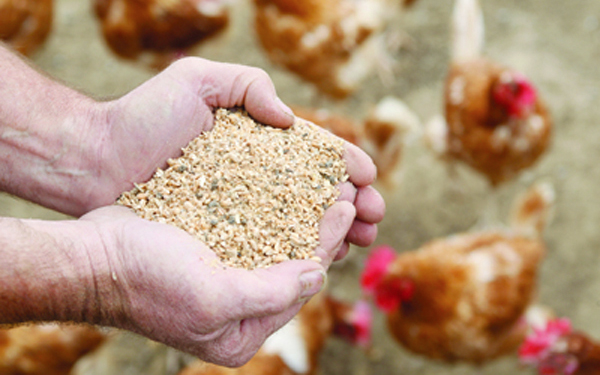
The effect of adverse weather conditions combined with concerns over feed bills have dented farmer confidence to invest according to a new survey.
Farmers remain relatively optimistic about the future of farming over the long-term but confidence in the red meat and pork sectors looks to remain weak.
NFU chief economist Phil Bicknell said the results came as “no surprise” given the exceptional year many farmers have experienced.
"The challenging year we’ve had makes it easy to forget that farming has been something of a success story in recent years, increasing its contribution to the economy, creating jobs, and seeing improvements in farm profitability, as well as underpinning one of the most successful British industries, food and drink" he said.
This, combined with a relatively lethargic world economy, has weighed on prices across the globe.
Results from the survey, now in its third year, show that last year’s relatively optimistic outlook has faded, and only 22 per cent of farmers surveyed are confident about the year ahead, compared to nearly one in two twelve months ago.
Some 42 per cent of farmers told the NFU that their farm businesses were in for a tougher year, up from 30 per cent in 2011.
Phil Bicknell said: "The drop in short term confidence is repeated across the sectors. For arable and horticulture, declines in crop output and quality, alongside difficult autumn planting conditions, have undoubtedly shaped farmer attitudes. The lowest levels of confidence, however, are seen in the livestock sector."
Rising animal feed costs have been well-documented in recent months, and the confidence of pork, dairy and red meat producers has tumbled as costs have risen.
Around the world, pig farmers are selling their herds because they can no longer afford to feed their pigs.
In the United States the government introduced a pork-buying programme in a bid to keep its pig farmers in business. And the Chinese government is putting pork into cold storage, as a buffer against shortages and high prices next year.
All main European pig-producing countries report shrinking sow herds. Falling numbers in the 12 months to June 2012 have been reported this week by Denmark (-2.3), Germany (-1.3), Ireland (-6.6), Spain (-2.8), France (-3.2), Italy (-13), Hungary (-5), the Netherlands (-3.6), Austria (-2.8), Poland (-9.6) and Sweden (-7.2).
While other sectors show confidence rising in the long-term, over the next five years this remains weak for red meat and pork. Tight supplies already characterise these markets and both sectors need greater confidence if we’re to see them able to respond.
"The longer term outlook is generally more positive than the short term attitudes" Bicknell said.
"Maintaining a degree of confidence is critical, given it shapes investment and production decisions across the industry. Results for the horticulture, poultry and arable sectors are notable in that they all show signs of increasing optimism when considering business prospects in the next five years.”
Across the channel there is a similar picture.
According to a recently published Copa-Cogeca confidence survey, the mood of French farmers has worsened, partly explained by high production costs and the poor economic situation.
In Germany the positive mood among farmers can be attributed to an improved analysis of the future fiscal situation, while their views on current economic developments are less positive compared to the first quarter of 2012.
After a summer of persistent rain, UK yields for 2012 have been mixed across arable crops which could cause food prices to rise further.
According to an NFU survey, English wheat yields decreased by 15% on the five year average.
The harvest survey also revealed that other major arable crops grown in the UK have performed well in difficult conditions, although without the investment made in technology by farmers the wheat harvest could have been much worse.
"We have seen a relatively low wheat yield this year, below seven tonnes per hectare. This is something not seen in the UK since the late 1980s" said NFU combinable crops adviser Guy Gagen.
"The abnormally high rainfall across the UK since early summer this year has depressed wheat yield. Without considerable investment by our farmers in recent years, the results for wheat could have been much worse this harvest."
Figures show England and Wales had the wettest summer for 100 years, with up to 14 inches of rain falling from June to August.
"There are many farmers who are down 25 to 30% on the wheat crop" said NFU President Peter Kendall.
"In some cases you looked from the outside and you thought, this crop will do over four tonnes to the acre - and it's been struggling to do three and some cases two tonnes to the acre."
"It's been soul destroying for the farmers growing the crops."
Many farmers will be looking to harvests across the world throughout 2013 to improve commodity supplies and reduce some of the pressures on feed costs.
Bicknell added: "However, policy makers will also shape industry confidence in the coming year. Two issues remain key. Firstly we need to see continued work for better regulation across all sectors to remove additional and unnecessary burden on farming businesses. Second, it is essential our government negotiates a CAP deal for British farmers which ensures they remain on a competitive level playing field with farmers and growers across Europe.
"Securing farmer confidence and long-term investment in this country will mean this industry can play its full part in providing the raw ingredients for the £80bn food and drink sector and continue helping the country on its way to economic recovery."
